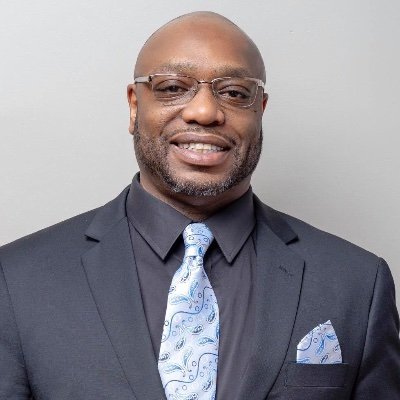
 Beyond the Title is a series of Q&As with alumni of Madison365’s Most Influential lists.
Beyond the Title is a series of Q&As with alumni of Madison365’s Most Influential lists.
Kenneth Ginlack (Wisconsin’s 40 Most Influential Black Leaders, 2024) is CEO and Executive Director of Serenity Inns, a drug treatment center for men in recovery. Before helping launch the organization in 2021 and opening its first facility in 2024, he served as the Director of Outpatient Programs for the Milwaukee County Behavior Health Division (BHD), and as an ad-hoc instructor at the University of Wisconsin Continuing Education extension program. At UW-Milwaukee, Ken instructs professionals on best practices for clinical supervision. He is the President of the Board of Directors for Revive Youth and Family Services, a Board member for SALS Recovery Houses & Coaching, and previously served as Vice President of the Board of Directors for Daystar Inc. Most recently, Ken was invited to become a member of the Milwaukee County Mental Health Board. Mr. Ginlack is a recipient of the President’s Award at Milwaukee Area Technical College (MATC) for his academic achievements and outstanding work in the community. At the 2022 National Alliance on Mental Illness (NAMI) – Wisconsin Annual Conference, Ken was honored with the IRIS Award for Outstanding Mental Health Professiona. He earned his undergraduate degree from Upper Iowa University in human services and a graduate degree from Loyola University in social work.
What does presence before performance mean to you – and how do you stay grounded when the pressure to perform is high?
Presence before performance means I bring my full self before I bring my resume. If I am not grounded, mind clear, heart open, values locked in, whatever I perform will not have integrity. Presence is eye contact, real listening, and letting purpose set the pace. The work is people, not optics.
When the pressure is high, I slow the room down and anchor myself.
Breathe and pray. A short pause, a few deep breaths, a quick prayer. Calm is contagious.
Name the why. I picture the men we serve and the families behind them. Mission over noise.
Stand on values. Dignity. Accountability. Love. If a decision does not line up, it is a no.
Lean on my team. I do not have to be the hero. I have to be steady. Delegate. Trust. Support.
Protect the basics. Water. Movement. Sleep. A brief walk outside. Simple and not negotiable.
Choose service over shine. I would rather be useful than impressive.
What’s the best advice you’ve received from a mentor?
To tell myself I am enough and every room I step in I belong.
Tell us about a time you had to lead before there was consensus – when you were the only one who saw it, believed it or were willing to act. What gave you the courage to move anyway?
Here is my story, plain and true.
I had to lead before there was consensus when I moved to build a new three million dollar treatment center. We were at capacity. Men were waiting. Families were praying. The need was not later. It was now. The board had real concerns about cost and risk. Good people. Wise people. Still unsure.
I slowed the room down. I brought presence first. I prayed. I named the why. I laid out the numbers with a clear plan. A realistic census. A conservative budget. Contingency in place. Community partners at the table. A timeline with checkpoints. I promised radical transparency every step.
What gave me the courage was simple. I saw the men we serve. I remembered my own journey. I thought about the mothers and the sons and the second chances. I stood on values. Dignity. Accountability. Love. I chose service over comfort. I believed we could build something beautiful and strong for our city.
We moved. We broke ground. We opened the doors. Today men are getting care in a space that says you matter. The lesson for me was clear. Sometimes leadership means stepping first with presence and faith. Then inviting others to walk with you as the vision becomes real.
What’s one question every new leader should ask during their first 100 days and why?
What do you need from me to do your best work for the people we serve?
Who’s in your “corner” – that voice of wisdom you trust when things get tough? How do you build and protect that circle?
I keep a small circle of wisdom. A couple of mentors. One or two elders who tell me the truth with love. A few peers who know the weight of leadership. Family who remind me who I am. They are the voices I trust when things get tough.
How I build it:
I connect with them on a regular rhythm even when things are not tough. I do this on purpose so the habit is set before the storm. I share what I am seeing. I ask what I am missing. I listen. I act. I report back.
How I protect it:
I keep confidences. I do not bring gossip. I honor their time by coming prepared with clear questions. I accept correction without ego. I give value back and make sure it is not a one way street. I pray for them and celebrate them. I keep the circle small so it stays strong.
Leadership can be exhausting. What practices or boundaries help you avoid burnout and stay aligned with your purpose?
Prayer and quiet. Move daily. Guard family time. Say no to what does not serve the mission. Share the load. Keep mentors close.
Clout fades. Calling lasts. How do you stay anchored in impact over recognition?
I measure success by healed lives not headlines.
I start and end with why we exist. Men in recovery. Families made whole.
I track real outcomes. Beds filled. Completions. Jobs. Reunited families.
I keep stories and names in front of me. Purpose over noise.
I guard my calendar so it matches the mission. If it does not serve the work it is a no.
I practice private disciplines. Prayer. Reflection. Service no one sees.
I share the credit and take the blame.
I ask my circle to check my ego and tell me the truth.
I celebrate quietly and get back to work.
What’s a leadership value you refuse to compromise even when it’s inconvenient?
I tell the truth even when it costs.
I will not spin numbers, over promise, or hide bad news.
I name reality, own my part, fix harm, and keep my word.
Integrity protects trust, and trust is the currency of leadership.
If it does not align with our values it is a no.
What book, quote, lyric or even scripture captures how you lead or how you live?
Invictus by William Ernest Henley.
Why it fits me:
It speaks to agency, grit, and dignity under pressure.
I choose presence first, then action, even when the path is hard.
It mirrors recovery work. We meet darkness with light and hope.
It reminds me to own decisions, protect my team, and stand on values.
These lines stay with me.
I am the master of my fate.
I am the captain of my soul.
That is not ego. That is stewardship and responsibility. I bow in prayer but I do not break. When we built the three million dollar treatment center and doubt was loud, I stayed steady, told the truth, and moved with courage. The poem calls me to lead with resolve, compassion, and accountability every day.
When life gets heavy or leadership feels overwhelming, what’s something you turn to: music, travel or cultural connection that helps you feel like yourself again?
Prayer and quiet. Scripture. I breathe and let God steady me.
Music. Gospel and old school soul. It lifts my head and softens my heart.
A slow drive in my 1969 Cadillac. Windows down. I think. I listen. I reset.
Brotherhood and tradition. Lodge nights. . A plate at dinner fellowship. Real talk with men in recovery. Laughter with family.
A walk by the lake. I let the wind clear the noise.
Who is your favorite sports team?
Green Bay Packers
What is your favorite holiday and why?
My grandkids light up the house. We cook. We laugh. We give.
It is faith, family, and joy in one season.



